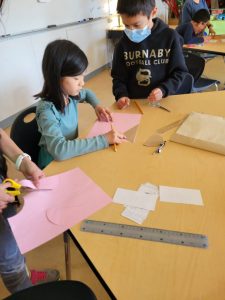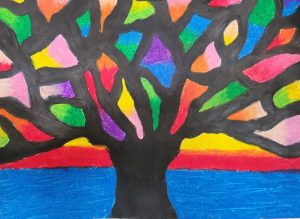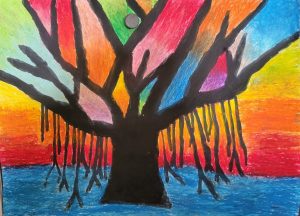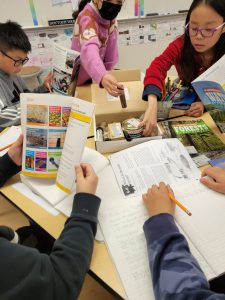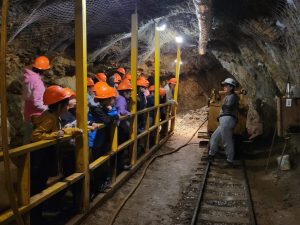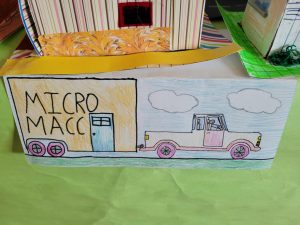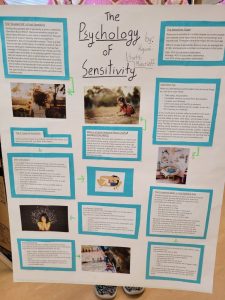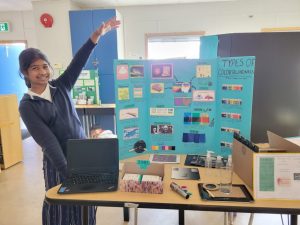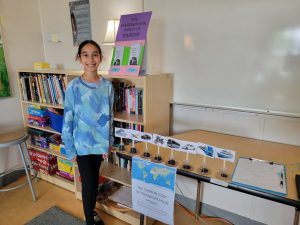Overview Division 5 MACC Term 3 April-June 2024
Term Three Overview, April-June 2024
To tie the big ideas from our curriculum together into larger, enduring understandings,
we studied subject areas through the lens of universal, conceptual themes.
Unit Title: Getting Our Needs and Wants Met!
Concepts: INTERDEPENDENCE & SYSTEMS
Core Competency Focus: Critical Thinking
Unit focus statement:
Humans create a variety of systems and tools to get their needs and wants met.
Unpacking NEEDS and WANTS — Socials/Science:
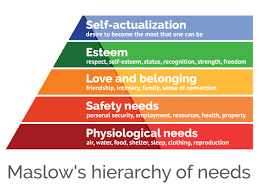 Students completed a brainstorm of their own needs and wants, then shared it in small-group discussions. We identified systems humans have created to fulfill basic needs and to provide social-emotional support for communities.
Students completed a brainstorm of their own needs and wants, then shared it in small-group discussions. We identified systems humans have created to fulfill basic needs and to provide social-emotional support for communities.
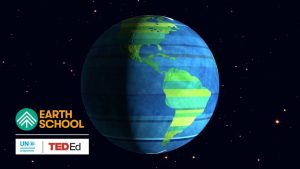 To get needs and wants fulfilled, we use a lot of renewable and non-renewable resources! What are they? Which ones do we use the most? How do they get to us? Are there problems with our use of resources? Students did a scavenger hunt in their homes, and we concluded minerals are used more than any other resource to make the things we use!
To get needs and wants fulfilled, we use a lot of renewable and non-renewable resources! What are they? Which ones do we use the most? How do they get to us? Are there problems with our use of resources? Students did a scavenger hunt in their homes, and we concluded minerals are used more than any other resource to make the things we use!
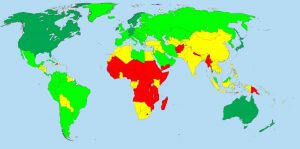 We also talked about the inequitable distribution of resources in the world — why some countries are richer than others, and why 1% of the population in many countries has 99% of the wealth.
We also talked about the inequitable distribution of resources in the world — why some countries are richer than others, and why 1% of the population in many countries has 99% of the wealth.
To understand how this problem relates to the concepts of systems and interdependence, we discussed economics, quality of life, government, and the geographical, political, and cultural factors that can impact a nation’s wealth and overall well being.
We played the International Game of Trade, in which groups of students pretended to be countries of varying levels of wealth in the world, trying to make and sell products (paper shapes) in the world market (our classroom), selling them to the World Bank (a set of students serving as bankers!)
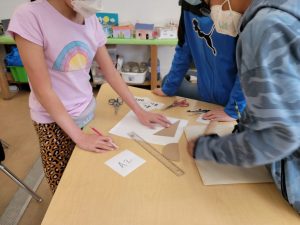 We had students serve as observers so afterwards we could have a discussion about the inequity of resources in the world, how supply and demand work, and how this game relates to real world economics.
We had students serve as observers so afterwards we could have a discussion about the inequity of resources in the world, how supply and demand work, and how this game relates to real world economics.
Sustainability – Socials, Science, Language Arts, Art:
Through the TED-Ed Earth School program online, the Orcas Footprints Sustainability Book Series on EPIC, and a virtual field trip through the Port of Vancouver, students discussed topics around sustainability, such as how many resources are used to make smartphones, the environmental and health costs of using plastics, and how the Port of Vancouver has made changes to be more sustainable to the environment while also supporting global trade. Thank you, Division 5, for your deep questions and thoughts about these topics in term three!
We also talked about Banyan Trees, where they are located, and sustainability in terms of our forests that support life on the planet. In connection with art curricular competencies and content around colour theory, negative-positive space, and blending oil pastels, we produced beautiful Banyan Trees for our class to enjoy.
Minerals, the most common resource! -Science, Socials, LA, Art:
If minerals are used more than any other resource in our homes, how do we find them? What kind of scientific knowledge is required to find all the building blocks of items we use? We were all surprised by the number of minerals used in everyday items, such as toothpaste, drywall in our homes, toilets, paints, and electronics.
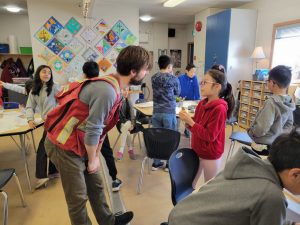 To better understand this, we started at the beginning. First, what is the difference between a rock, a mineral, and an element? What are the different types of rocks? Where would you find them? What are the geological processes that create the minerals we need? Students read Geology of the Pacific Northwest on EPIC to learn about the basics of geology.
To better understand this, we started at the beginning. First, what is the difference between a rock, a mineral, and an element? What are the different types of rocks? Where would you find them? What are the geological processes that create the minerals we need? Students read Geology of the Pacific Northwest on EPIC to learn about the basics of geology.
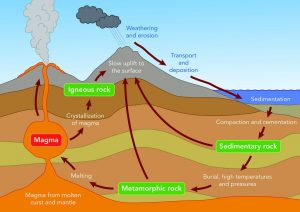 We discussed the rock cycle, plate tectonics, the geological history of British Columbia, and how geologists make careful observations to determine the land’s story. Who knew the Rocky Mountains were once under the ocean? Did you know we have volcanoes very near to where we live? Why is the rock on Vancouver Island different from that of Vancouver Mainland?
We discussed the rock cycle, plate tectonics, the geological history of British Columbia, and how geologists make careful observations to determine the land’s story. Who knew the Rocky Mountains were once under the ocean? Did you know we have volcanoes very near to where we live? Why is the rock on Vancouver Island different from that of Vancouver Mainland?
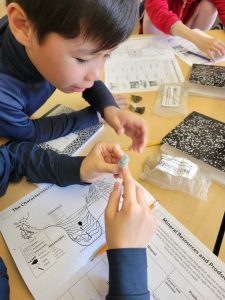 We read Old Rock is Not Boring, and reflected on how every rock has an amazing story! Both through in-class inquiry stations, we did hands-on looking at rocks, as students tried to figure out the names of rocks and minerals in Ms. D’s personal collection, where they came from, and how they formed. We also had a great workshop from a real geologist through Minerals Education BC, learning how to classify rocks and minerals through a series of questions, close observations, and tests.
We read Old Rock is Not Boring, and reflected on how every rock has an amazing story! Both through in-class inquiry stations, we did hands-on looking at rocks, as students tried to figure out the names of rocks and minerals in Ms. D’s personal collection, where they came from, and how they formed. We also had a great workshop from a real geologist through Minerals Education BC, learning how to classify rocks and minerals through a series of questions, close observations, and tests.
Ms. D presented activities designed to help understand how the periodic table is related to geology; the difference between an element and a mineral; how the rock cycle involves changes in matter through physical and chemical forces such as erosion, heat, pressure, and the bonding of elements; and how rocks form out of cooling liquid magma.
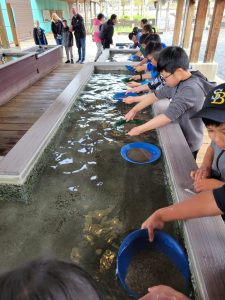 We also had the opportunity to go on a fun field trip to Britannia Mines, where we did gold panning, learned the history of a copper mine in British Columbia, watched demonstrations about tools used for mining in the past, discussed the rock cycle, and discussed how they clean the water from the mine so the remaining copper in the mountain doesn’t seep out and contaminate the ocean.
We also had the opportunity to go on a fun field trip to Britannia Mines, where we did gold panning, learned the history of a copper mine in British Columbia, watched demonstrations about tools used for mining in the past, discussed the rock cycle, and discussed how they clean the water from the mine so the remaining copper in the mountain doesn’t seep out and contaminate the ocean. 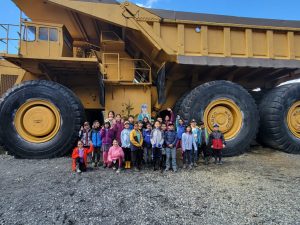
To continue our mining and sustainability discussions, students did cookie mining, seeing if they could find chocolate chips, make a profit in their mine, and do the proper reclamation of the site to be environmentally responsible!
Congratulations to Division 5 for amazing questions and discussions after our experiments. I think we have many future geologists in the group!
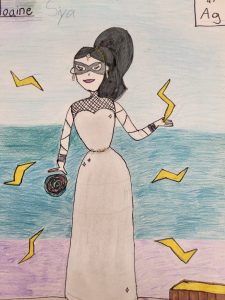 In connection with our science, students created superheroes or villains based off of an element from the periodic table, using their research about the element to give their character special powers! They then created art pieces and monologues about their characters. Thank you, Division 5, for your amazing creativity with props, costumes, and voice as you presented to the class!
In connection with our science, students created superheroes or villains based off of an element from the periodic table, using their research about the element to give their character special powers! They then created art pieces and monologues about their characters. Thank you, Division 5, for your amazing creativity with props, costumes, and voice as you presented to the class!
ECONOMICS & MACC MALL — Math, ADST, Socials, Career Education:
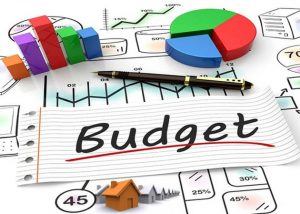 Financial literacy was the key focus of our numeracy studies, which connected well with discussions about resource management, wealth, and economics.
Financial literacy was the key focus of our numeracy studies, which connected well with discussions about resource management, wealth, and economics.
Each student pretended they were living on their own and brainstormed all of the things they would have to pay for independently! We began doing Classroom Economy, which was a lot of fun. Everyone received a job assignment and a salary, and then everyone had to pay rent for their classroom space. Each week, they had to work to save appropriately to both pay their expenses and have extra cash to spend on the Class Store!
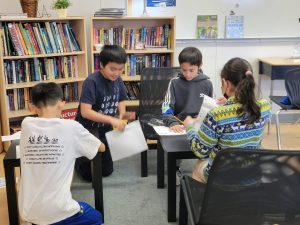 As part of understanding money, we discussed proper notation, currency exchange, and why currencies are different between countries. We talked about taxes, both those taken off of salaries and those paid at stores, and how those monies are used to pay for services we enjoy at each level of government.
As part of understanding money, we discussed proper notation, currency exchange, and why currencies are different between countries. We talked about taxes, both those taken off of salaries and those paid at stores, and how those monies are used to pay for services we enjoy at each level of government.
We also talked about how bank accounts, credit cards, and debit cards work, discussed loans/mortgages, calculated interest, learned the meaning of inflation, and talked about how current events are impacting everyone’s finances.
Students were given opportunities to practice adding, subtracting, multiplying, and dividing decimal money amounts, especially as we practiced finding the better deal at stores! We discussed percentages and how they work when giving a tip at a restaurant or reading ads about store discounts.
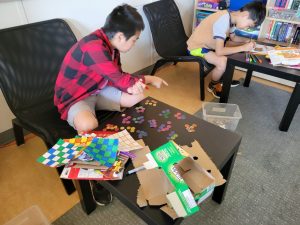 Finally, students participated in MACC MALL! They were given some start up cash through Classroom Ecoomy, started their own business, used ADST skills to design a product, and then sold it with pretend ticket money at MACC Mall to other visiting classes from Suncrest. It was great fun and hands-on financial learning!
Finally, students participated in MACC MALL! They were given some start up cash through Classroom Ecoomy, started their own business, used ADST skills to design a product, and then sold it with pretend ticket money at MACC Mall to other visiting classes from Suncrest. It was great fun and hands-on financial learning!
PHE, French, and Other Fun Activities….
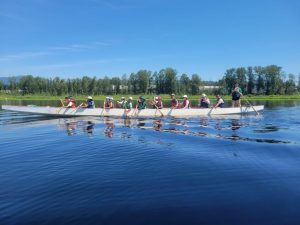 And, along with these many activities, we also continued our physical and health education through collaborative games, Jump Rope for Heart Day, Sports Day, and movement breaks outside while doing our projects.
And, along with these many activities, we also continued our physical and health education through collaborative games, Jump Rope for Heart Day, Sports Day, and movement breaks outside while doing our projects.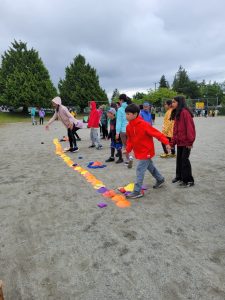
In June, we were lucky to have a half day of dragon boating, which is not only fun, but also involves collaboration, communication, social-thinking, and physical-fitness skills! We had a great time racing on the water and playing games with our leaders at Burnaby Canoe and Kayak on Burnaby Lake.
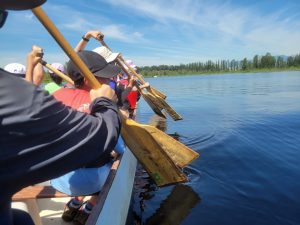 Students also enjoyed fun activities such as learning French vocabulary through online games; our Celebration of Learning about Compassion with speaking, singing, and readers theatre drama; and the Mirzakhani Math Challenge done in May and June for fun!
Students also enjoyed fun activities such as learning French vocabulary through online games; our Celebration of Learning about Compassion with speaking, singing, and readers theatre drama; and the Mirzakhani Math Challenge done in May and June for fun!
ADST is really all year long…..
The year was full of opportunities to use the design cycle, which includes defining a problem, ideating, prototyping, testing, making, and sharing!
For example, students:
- presented and organized ideas using Book Creator and PowerPoint,
- formed their own business and created products for MACC Mall,
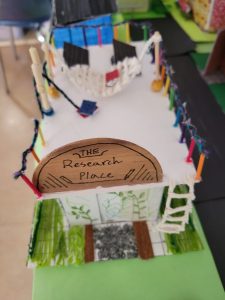 made board games to show learning about human body systems,
made board games to show learning about human body systems,- applied geometry and measurement knowledge to create a tiny house model,
- participated in Hour of Code and designed games or activities using block code and Scratch,
- experimented with making electrical circuits through Scrappy Circuits building,
- collaboratively designed Rube Goldberg machines and marble roller coasters,
- described their design process using e-portfolio reflections and pictures to document their learning, and
- demonstrated a willingness to work with new materials, to collaborate with others in developing ideas, and to safely store tools and technologies used.
Independent Project —
Curricular Competencies Across Subjects AND Career Education:
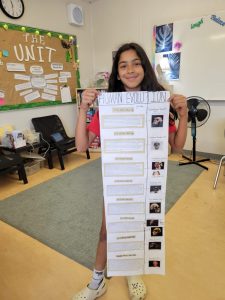 By end of January, most students had selected topics for independent study. They were allowed to select any topic as long as it was something they sincerely cared about!
By end of January, most students had selected topics for independent study. They were allowed to select any topic as long as it was something they sincerely cared about!
During each project this year, we developed curricular competencies to help with a successful independent inquiry.
These skills can be found in almost every aspect of the curriculum, including career education, social studies, language arts, science, fine arts, and applied design.
Here is a summary of some areas we address through Independent Project, running from January to June:
- Understanding passions and making a commitment to pursue personal interests
- Project management, goal setting, and meeting deadlines,
- Self-management as they monitor their time during open work periods,
- Asking questions that further an inquiry, including open and closed questions,
- Documenting and organizing research through notes and a bibliography,
- Searching online effectively, including finding reliable and safe resources,
- Using critical thinking to analyze resources and summarize findings,
- Communicating findings in writing and through public speaking,
- Applying creative thinking by sharing results through a variety of media, and
- Reflecting during and after the process of researching and creating, independently thinking about successes and areas for future growth.
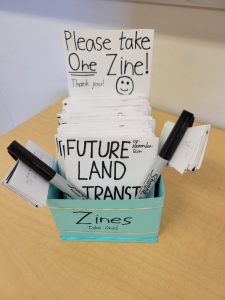 Thank you to all of Division 5 for their amazing work this year, and to our parents and staff for attending the presentation of their projects.
Thank you to all of Division 5 for their amazing work this year, and to our parents and staff for attending the presentation of their projects.
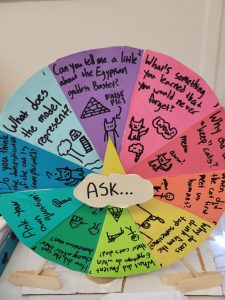 Our Independent Projects from 2024 can be found on this page, with a selection of the digital portions of student in-person presentations from June 11th.
Our Independent Projects from 2024 can be found on this page, with a selection of the digital portions of student in-person presentations from June 11th.
Thank you, Division 5, for a great 2023-24 school year! Please see our e-portfolios for more details on the activities we have done.

